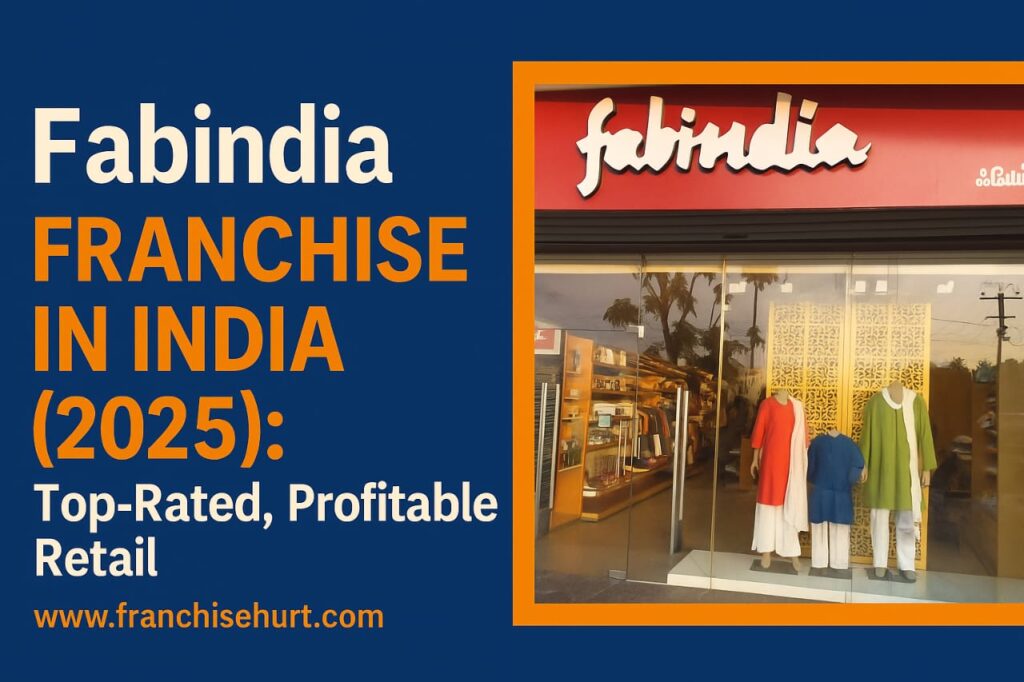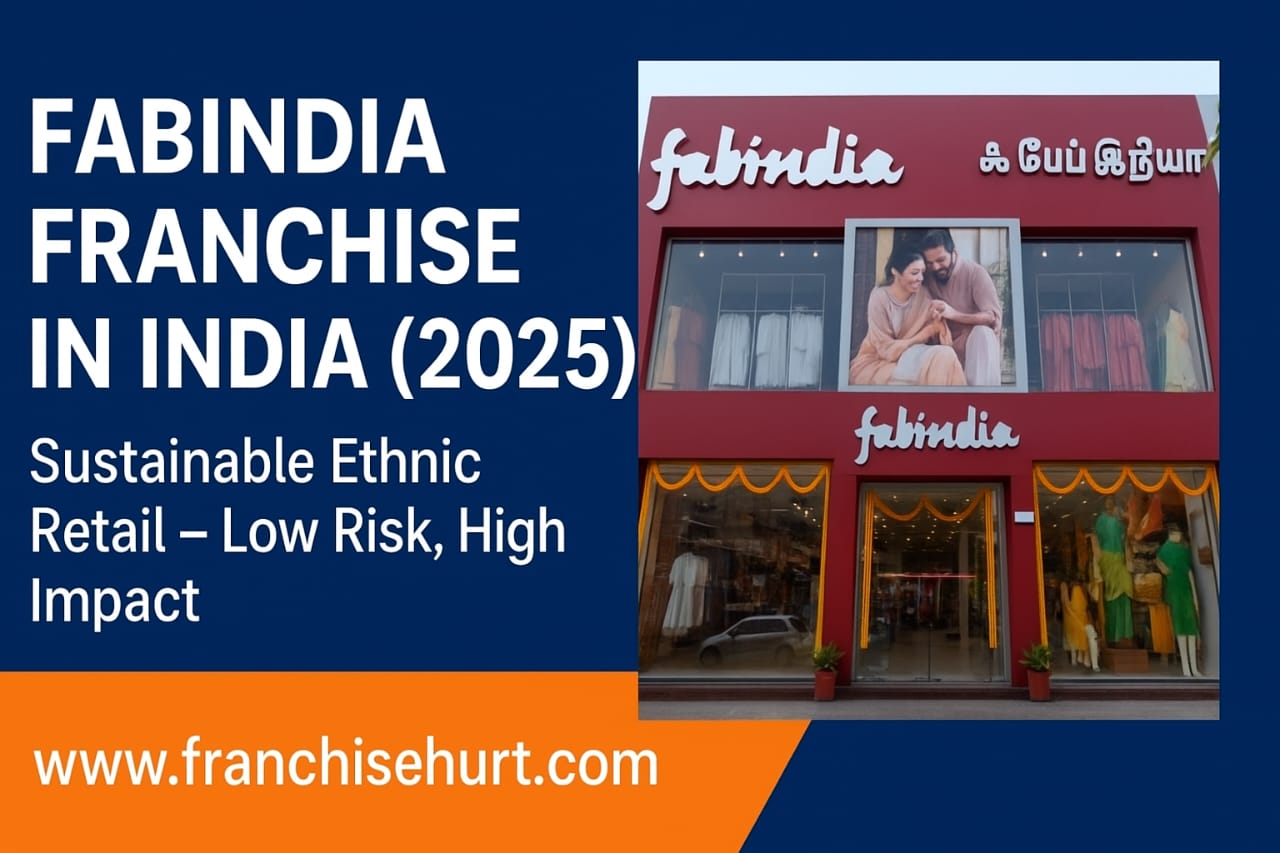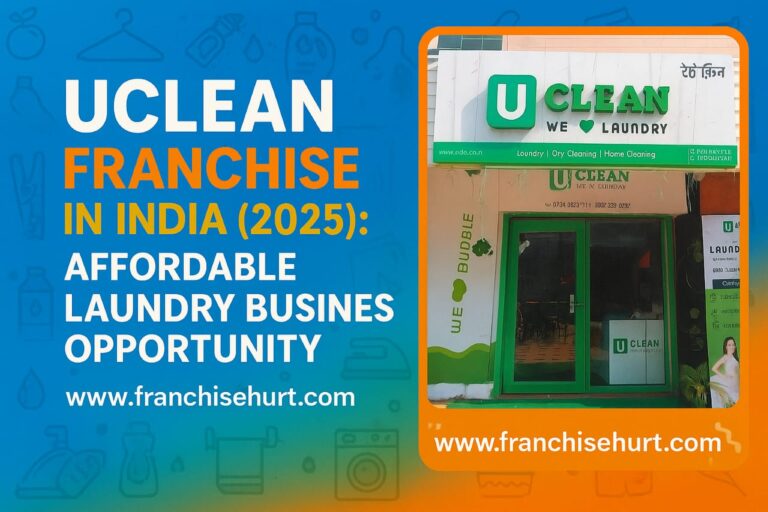Fabindia Franchise in India (2025): Sustainable Ethnic Retail – Low Risk, High Impact

Quick Overview Table
| Aspect | Details |
|---|---|
| Founded | 1960 by John Bissell |
| Franchise Type | Ethnic retail (apparel, home, organic food) |
| Investment (Estimated) | ₹30–50 lakhs (high street/mall) (Franchise India) |
| Area Required | 700–1,500 sq ft |
| ROI Estimate | ~24% annual ROI, based on industry reports |
| Stores (as of 2020) | ~327 stores across India; international presence |
| Company HQ | New Delhi, India |
| Apply Link | Fabindia Franchise |
Table of Contents
Introduction
India’s ethnic retail sector has seen exponential growth in recent years, and Fabindia stands out as the pioneer in blending heritage crafts with modern fashion and lifestyle needs. Established in 1960, the brand continues to empower rural artisans while meeting the demands of urban customers who value authenticity, sustainability, and style.
For entrepreneurs in 2025, a Fabindia franchise is more than a retail venture—it’s a chance to represent India’s culture while tapping into a high-growth, premium retail segment.
Founder & Brand Legacy
- Founder: John Bissell (1960), who envisioned bringing Indian handloom and handmade crafts to global markets.
- Current Leadership: William Nanda Bissell (MD) has expanded Fabindia into apparel, furniture, organic food, personal care, and home décor.
- Impact: Fabindia connects 40,000+ artisans and communities to markets, creating sustainable livelihoods while preserving traditional crafts.
Why Choose Fabindia Franchise in 2025?
- Strong Brand Recall – Fabindia is a household name in urban India, synonymous with ethnic lifestyle.
- Growing Market – The ethnic apparel industry alone is valued at billions, with women’s wear dominating demand.
- Premium Consumer Base – Positioned for affluent and conscious buyers, ensuring stable sales.
- Low Marketing Cost – Fabindia relies heavily on word-of-mouth, brand reputation, and loyal customers rather than expensive advertising.
- Diversified Products – From apparel to organic food, multiple revenue streams ensure better ROI.
Market Insights
- Ethnic apparel accounts for 74% of women’s fashion in India, but only 25% is organized retail—leaving massive room for growth.
- India’s urban youth and professionals are increasingly shifting to sustainable fashion and lifestyle products.
- Fabindia is expanding to Tier-II and Tier-III cities where aspirational customers are embracing branded ethnic retail.
- International expansion is also underway, giving franchisees long-term growth potential.
Investment & ROI Breakdown
| Investment Component | Estimated Cost (INR) |
|---|---|
| Setup & Inventory | ₹30–50 lakhs |
| Space Requirement | 700–1,500 sq ft |
| ROI Estimate | ~24% annually |
| Average Payback Period | 2–3 years |
Fabindia is positioned as a mid- to premium-level franchise—not as low-cost as kiosks but highly stable in urban markets.
Achievements & Recognitions
- Recognized by The Economic Times as “Best Retail Brand” in 2004.
- Case studies at Harvard Business School highlight its unique artisan-supply model.
- Operates in over 33 countries via online and offline channels.
- Respected as one of India’s most ethical lifestyle brands.
Best Places to Keep a Fabindia Franchise Store
Choosing the right location is critical to Fabindia’s success. Based on industry insights and current store trends, the best locations include:
- High-Street Markets – Popular shopping hubs in metros like Delhi (Connaught Place), Mumbai (Bandra), or Bangalore (Indiranagar).
- Premium Shopping Malls – High-end malls such as DLF Mall of India (Noida), Phoenix Marketcity (Mumbai, Bangalore, Chennai).
- Airports & Tourist Zones – Perfect for premium buyers, NRIs, and tourists seeking authentic Indian products.
- Tier-II City Centers – Expanding into markets like Jaipur, Kochi, Lucknow, and Indore ensures untapped growth.
- Cultural/Art Districts – Areas that attract craft lovers, heritage enthusiasts, and lifestyle shoppers.
Placing a Fabindia store in affluent neighborhoods or corporate hubs ensures higher visibility and customer loyalty.
Also Read: Biba Franchise in India (2025)
Eligibility & Required Documents
Eligibility:
- Investment capacity of ₹30–50 lakhs.
- Commercial space in prime retail or mall locations.
- Prior retail/business experience preferred.
Documents Required:
- Identity & Address Proofs (Aadhar, PAN, etc.)
- GST Registration Certificate
- Lease Agreement or Ownership Papers
- Bank Statement/Financial Proofs
- Business Proposal/Franchise Application
How to Apply
To apply for a Fabindia franchise:
- Visit the Official Franchise Page
Go to Fabindia Franchise Application to access the inquiry form. - Fill Out the Inquiry Form
Provide essential details:- Personal Information (Name, Contact)
- Desired Store Location (City, Preferred Market)
- Investment Capacity
- Store Space Availability (e.g., 1,000–2,500 sq ft)
- Background or Business Experience
- Submit and Await Contact
Fabindia’s franchise development team will review your submission and reach out for further discussion. - Site Feasibility & Evaluation
If shortlisted, Fabindia will assess the proposed store location to ensure alignment with brand standards and market potential. - Sign Franchise Agreement
Upon approval, you’ll discuss the terms investment, support structure, store setup timeline and finalize the franchise agreement. - Store Setup & Brand Launch
Once onboarded, Fabindia assists with end-to-end support:- Store layout & interiors
- Inventory planning & supply chain
- Staff training & POS setup
- Marketing & brand visibility
Conclusion
The Fabindia franchise opportunity in 2025 blends profitability with purpose. It is ideal for entrepreneurs who want to invest in a premium, sustainable retail business while enjoying a stable ROI of ~24%. With its strong customer base, ethical brand image, and artisan-driven supply chain, Fabindia stands out as one of the most resilient and socially impactful franchise opportunities in India.
Frequently Asked Questions(FAQs)-Fabindia franchise
How much does it cost to start a Fabindia franchise?
Around ₹30–50 lakhs, depending on the store size and location.
What is the ROI for Fabindia?
Industry estimates suggest ~24% annually.
How much space is required?
700–1,500 sq ft, preferably in premium markets or malls.
Who is the founder of Fabindia?
Founded by John Bissell in 1960, now led by William Nanda Bissell.
How many stores does Fabindia have?
Over 327 in India and presence in multiple countries via e-commerce.
Where should I open a Fabindia store?
Best in high-footfall markets, premium malls, airports, and affluent Tier-II city centers.
How do I apply for a Fabindia franchise?
Visit the official page fabindia.com/franchise, fill out the inquiry form, and the Fabindia team will contact you with next steps.







